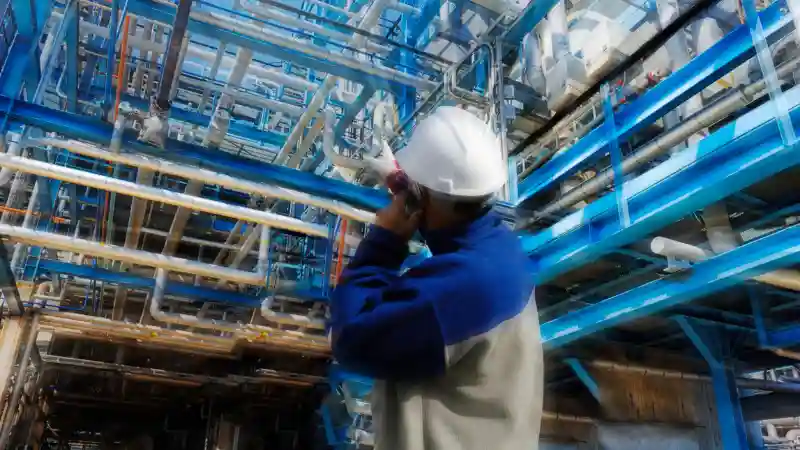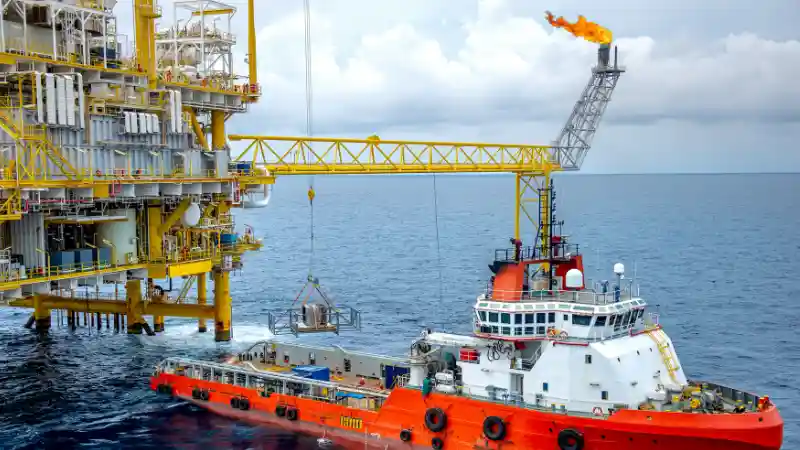Navigating the job market can be a challenging feat for individuals with a criminal record, especially when seeking opportunities in specialized industries such as offshore work. Despite the obstacles ex-felons may face, there are avenues available for them to embark on fulfilling careers in the offshore sector. When it comes to offshore jobs and opportunities, ex-felons might find themselves navigating uncharted waters. However, the offshore industry holds promising prospects for those looking to make a fresh start.
Also, offshore jobs for felons require lots of zeal, strength, and consistency to beat the challenges and stigma that come with it. However, we’ll take a look at the effective strategies for securing employment, the significance of skill development, and legal considerations. With all these, we hope to provide valuable insights and guidance for ex-felons striving to build successful careers in the offshore industry.
Offshore Jobs For Ex-felons

Offshore jobs can provide unique opportunities for felons looking to re-enter the workforce and build a successful career. Working in the offshore industry often involves demanding physical labor, but it can also offer competitive salaries, access to training and advancement opportunities, and the chance to work in a dynamic and challenging environment.
There are a variety of offshore jobs that felons may be able to pursue, depending on their skills, experience, and interests. These roles can range from entry-level positions such as laborers and cooks to more specialized roles like technicians, operators, or supervisors.
While some offshore companies may have strict hiring policies regarding criminal backgrounds, there are also organizations and programs dedicated to helping ex-offenders find employment opportunities in the offshore industry. These resources can provide support with job training, resume building, interview preparation, and connections to employers who are open to hiring individuals with prior criminal records.
Former felons interested in pursuing offshore careers should be prepared to highlight their skills, experience, and commitment to turning their lives around. They may also need to be prepared for background checks and potential challenges during the hiring process. However, with determination, hard work, and the right support, ex-felons can find success and stability in the offshore industry.
Strategies For Finding Offshore Jobs As An Ex-Felon
Finding offshore jobs as an ex-felon can be challenging, but some strategies can increase your chances of securing employment in this industry. Here are some tips to help you navigate the job search process:
1. Seek Out Organizations And Programs That Assist Ex-offenders
Some organizations and programs specifically help individuals with criminal backgrounds find employment opportunities. These resources can provide job training, resume assistance, networking opportunities, and job placement services tailored to ex-felons.
2. Highlight Your Skills And Experience
Emphasize your relevant skills, experience, and qualifications on your resume and during job interviews. Focus on showcasing your work ethic, reliability, and determination to succeed in the offshore industry.
3. Obtain Certifications And Training
Consider obtaining certifications or training relevant to the offshore industry, such as safety certifications, welding certifications, or specialized technical training. Having these qualifications can make you a more competitive candidate for offshore jobs.
4. Network With Industry Professionals
Attend industry events, job fairs, and networking events to connect with professionals in the offshore industry. Building relationships with individuals already working in the field can lead to job opportunities and mentorship.
5. Be Honest About Your Criminal Background
It’s important to be honest about your criminal history during the job application process. Address your past mistakes openly and explain how you have worked to overcome them and are committed to building a successful career in the offshore industry.
6. Consider Entry-level Positions
Starting in an entry-level position can be a good way to gain experience in the offshore industry and prove your skills and work ethic. Once you have established yourself, you may have the opportunity to advance to more specialized roles.
7. Stay Persistent And Positive
The job search process can be challenging, especially as an ex-felon. Stay persistent in your job search efforts, and maintain a positive attitude throughout the process. Keep applying to jobs, following up on applications, and seeking out new opportunities.
By utilizing these strategies and seeking out support from resources for ex-offenders, you can increase your chances of finding offshore jobs and building a successful career in this industry.
Importance Of Skill Development And Training For Offshore Work
Skill development and training are crucial for individuals working in offshore industries due to the unique challenges and risks associated with working in such environments. Offshore work involves operating heavy machinery, navigating complex equipment, and working in potentially hazardous conditions, making it essential for workers to receive proper training and develop the necessary skills to ensure their safety and the success of their projects.
Some of the key reasons why skill development and training are important for offshore work include:
1. Safety
The offshore environment poses various safety risks, including extreme weather conditions, high-pressure equipment, and potential exposure to hazardous materials. By receiving comprehensive training, workers can learn how to operate equipment safely, identify and mitigate risks, and respond effectively in emergencies to protect themselves and their colleagues.
2. Compliance
Offshore industries are heavily regulated, with strict guidelines and standards that must be followed to maintain compliance with health, safety, and environmental regulations. Proper training ensures that workers understand these regulations and can perform their duties under legal requirements, reducing the risk of accidents and regulatory violations.
3. Efficiency
Skilled workers can perform their tasks more efficiently, leading to increased productivity and cost-effectiveness for offshore projects. Training helps workers improve their technical skills, problem-solving abilities, and decision-making skills, enabling them to carry out their roles effectively and contribute to the success of their projects.
4. Career Growth
Ongoing skill development and training opportunities can help employees advance in their careers and attain higher positions within the offshore industry. By continuously improving their skills and knowledge, workers can increase their value to employers and broaden their career opportunities in this competitive field.
Overall, skill development and training play a critical role in ensuring the safety, compliance, efficiency, and career growth of individuals working in offshore industries. By investing in comprehensive training programs and providing opportunities for skill development, employers can create a capable workforce that is prepared to meet the challenges of offshore work and achieve success in this demanding environment.
Legal Considerations And Disclosure Requirements For Ex-Felons In Offshore Industries
Ex-felons seeking employment in offshore industries may face unique legal considerations and disclosure requirements due to their criminal backgrounds. When applying for jobs in the offshore sector, ex-offenders should be aware of the following legal considerations and disclosure requirements:
1. Background Checks
Employers in the offshore industry often conduct thorough background checks on job applicants to ensure they meet security clearance requirements and do not pose a risk to the safety and security of offshore facilities. Ex-felons should be prepared for their criminal history to be scrutinized during the hiring process.
2. Legal Restrictions
Certain offshore jobs may have legal restrictions that prevent individuals with certain types of criminal convictions from obtaining employment in specific roles. Ex-felons should familiarize themselves with the legal requirements and restrictions in the offshore industry to determine if their criminal background may pose a barrier to employment.
3. Disclosure Requirements
In many cases, ex-felons must disclose their criminal history on job applications or during the hiring process. Ex-felons need to be honest and transparent about their past convictions, as failure to disclose this information could result in negative consequences, including termination of employment.
4. Rehabilitation Efforts
Ex-felons who have completed rehabilitation programs, received certifications or credentials, or participated in job training and skill development programs may have an advantage in the hiring process. Highlighting efforts to rehabilitate and improve oneself can demonstrate to employers a commitment to personal growth and responsibility.
5. Legal Protections
Some states have laws that protect ex-felons from discrimination in the hiring process based on their criminal history. Ex-felons should be aware of their rights and seek legal advice if they believe they have been unfairly discriminated against due to their past convictions.
Ex-felons seeking employment in offshore industries should be aware of the legal considerations and disclosure requirements related to their criminal backgrounds. By understanding these factors and taking proactive steps to address any barriers to employment, ex-felons can increase their chances of securing a job in the offshore sector and building a successful career in this industry.
Types Of Offshore Jobs For Felons

While the hiring policies of offshore companies may vary, there are some types of jobs in offshore industries that may be more accessible to individuals with felony convictions. Some possible job roles that felons may be able to work in offshore industries include:
1. General Laborer
Many offshore projects require a variety of general labor tasks, such as cleaning, maintenance, and basic construction work. These entry-level positions may be more open to individuals with felony convictions.
2. Cook Or Kitchen Staff
Offshore installations often have catering and food service departments that require cooks, kitchen staff, and food service workers. Individuals with culinary training or experience may find opportunities in these roles.
3. Janitorial Or Housekeeping Staff
Offshore facilities need to be kept clean and well-maintained, so janitorial and housekeeping staff play a critical role in maintaining the cleanliness and hygiene of the accommodations.
4. Equipment Operators
Some offshore projects may require individuals to operate equipment such as forklifts, cranes, or other machinery. Individuals with relevant certifications and experience in operating heavy machinery may find opportunities in these roles.
5. Oil drilling
Securing offshore oil drilling jobs can be difficult for individuals with felony convictions due to industry regulations and safety standards. Important factors for felons include getting the required certifications, being honest about their criminal background, demonstrating rehabilitation efforts, and networking within the industry. Despite challenges, individuals with the right qualifications, certifications, and a positive attitude towards rehabilitation may still find opportunities in offshore oil drilling by being proactive and transparent about their criminal history.
6. Underwater Welders
The specialized and demanding job of underwater welding involves joining metal structures underwater, requiring specific training, certifications, and experience. While challenging for individuals with felony convictions to secure employment in this field, some companies may hire them on a case-by-case basis. Factors to consider include obtaining necessary certifications, being honest about criminal background, showcasing rehabilitation efforts, and building networks within the industry. Despite challenges, individuals with the right qualifications, certifications, and a positive attitude towards rehabilitation may still have opportunities to pursue a career in underwater welding by demonstrating skills and dedication.
7. Electrician
Working as an electrician offshore involves installing, maintaining, and repairing electrical systems on oil rigs and platforms. Key considerations for those interested include education, experience, safety training, flexibility, and necessary licenses and certifications. Offshore electricians need a high school diploma, and relevant training, and may require completion of safety courses. Prior experience in electrical work and adaptability to challenging conditions are important. Obtaining the required licenses and certifications specific to offshore work is crucial. Overall, pursuing a career as an offshore electrician can bring professional growth, competitive pay, and opportunities to work in a dynamic environment with the right qualifications and training.
8. Rig Manager
A Rig Manager at an offshore location is responsible for overseeing the operations on the drilling rig, ensuring that all activities are carried out safely, efficiently, and in compliance with company regulations and industry standards. They are typically in charge of a team of workers including drillers, technicians, and other crew members. The Rig Manager is also responsible for managing equipment maintenance, monitoring production levels, and ensuring that all necessary supplies are available. They play a key role in ensuring that the rig operates smoothly and meets production targets.
9. Surveyor
A surveyor job at an offshore location typically involves conducting surveys and measurements of the seabed and underwater structures using specialized equipment such as sonar, GPS, and echo sounders. The surveys may be required for various purposes such as construction projects, oil and gas exploration, or environmental assessments.
The responsibilities of a surveyor at an offshore location may include:
– Planning and organizing survey operations
– Conducting surveys and collecting data
– Analyzing and interpreting survey data
– Collaborating with other team members and clients
– Ensuring compliance with safety regulations and standards
– Maintaining and calibrating survey equipment
– Reporting findings and recommendations to stakeholders
In addition to technical skills and knowledge of surveying techniques, a surveyor working offshore must also have good communication skills, problem-solving abilities, and the ability to work in challenging and often unpredictable conditions. A background in marine engineering, geomatics, or a related field is typically required for this role.
10. Pump Technician
A pump technician job at an offshore location involves maintaining, repairing, and troubleshooting pumps and pumping systems used in offshore operations. Responsibilities include routine maintenance, diagnosing and fixing pump issues, installing and testing pump systems, and adhering to safety protocols. Qualifications typically include a background in mechanical engineering or maintenance technology, experience with pump systems, and offshore certifications like Basic Offshore Safety Induction and Emergency Training (BOSIET) and Helicopter Underwater Emergency Training (HUET). Good problem-solving skills and the ability to work collaboratively are important for this role.
Offshore companies have different hiring policies for candidates with felony convictions. Individuals with criminal backgrounds need to be honest and upfront about their convictions during the application process. They should highlight relevant skills and rehabilitation efforts to increase their chances of getting hired. Consider seeking assistance from organizations that aid job seekers with criminal records in offshore industries.
Check out ExxonMobil jobs available for you.
Final Thoughts

In conclusion, offshore jobs can provide felons with valuable employment opportunities that can help them reintegrate into society and build successful careers. These jobs can provide stable income, training and education opportunities, and a chance to develop new skills and experiences. While there are challenges and barriers for felons seeking offshore jobs, they can overcome these obstacles with determination and perseverance and build a bright future for themselves. Employers in the offshore industry should consider the benefits of hiring ex-felons and provide them with the support and resources they need to succeed in these roles. By giving ex-felons a second chance, they can contribute positively to the workforce and society.

I’m Cli, also known as Castro. An author of felhus.com
I’ve got great passion for felons and wanna see them live absolutely normal again.
